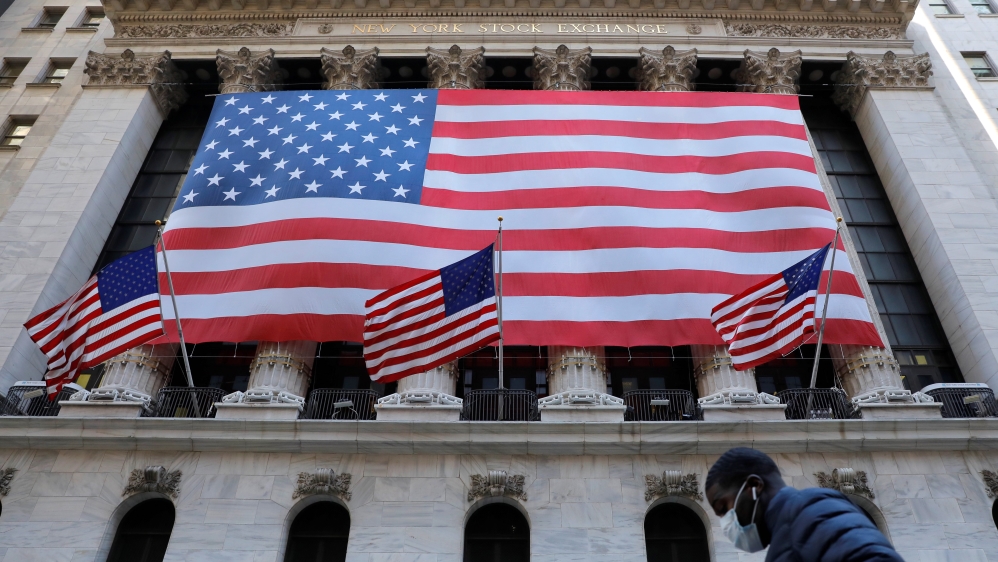Market carnage grew even more violent on Monday after the United States Federal Reserve’s surprise interest rate cut and other emergency measures to shore up the economy against an onslaught of coronavirus disruptions failed to stem deepening fears.
The Dow Jones Industrial Average closed down 2,997 points or 12.93 percent – marking its worst one-day point loss ever.
More:
The broader S&P 500 index tanked just shy of 12 percent. For the third time in a week, the index – a performance gauge for US pension accounts and college savings plans – fell below seven percent at the open, triggering a 15-minute halt in trading.
The Nasdaq Composite Index closed down 12.32 percent.
All three major US indexes had their worst one-day percentage drops since the 1987 market crash.
The stock selloff accelerated into the market close after US President Donald Trump told reporters that the economy “may be” heading into recession and that the worst of the outbreak may not be over until August or later.
A recession is defined as two straight quarters or six consecutive months of negative economic growth.
Stocks weren’t the only asset class that fell prey to coronavirus panic.
The reputation of precious metals as a safe haven in times of uncertainty was tarnished once again as spot gold prices tumbled more than 7.5 percent before paring back a fair chunk of that loss.
Bitcoin was also bludgeoned, with Bloomberg data showing that it plunged as much as 18 percent on Monday before clawing back some of those losses.
The Fed pulled pages from its crisis-era playbook on Sunday, slashing interest rates to near zero and unleashing a handful of other measures designed to keep credit markets – which have been showing signs of stress in recent weeks – running smoothly.
Among the measures, the Fed decided to restart “quantitative easing” or QE – the programme of buying bonds from the US Treasury and mortgage-backed securities markets. By supporting the smooth functioning of these markets, the Fed is attempting to help businesses and consumers access the credit they need to weather the coronavirus storm.
The Fed also slashed reserve requirements for thousands of US banks and eased conditions for banks at the discount window – again with the aim of helping financial institutions more easily meet the demand for credit from households and businesses straining under virus disruptions.
On a more global scale, the Fed in concert with five other central banks reduced the pricing on dollar swap lines to ensure that there is a sufficient amount of US dollars – the global reserve currency – to ensure that the markets for borrowing and lending greenbacks overseas do not become overly strained. If these markets seize up, it could feed back into the US economy.
But with so many unknowns surrounding the coronavirus outbreak, investors took little solace from the Fed’s extraordinary actions.
“As the scale of the economic and market disruption wrought by the coronavirus becomes clear, it seems likely that investors will increasingly start to question whether policymakers have already exhausted their capacity to respond,” Capital Economics group chief economist Neil Shearing wrote in a client note this morning. “As we have noted before, history suggests that equity markets are only likely to bottom out when it becomes clear that the flow of new cases of the virus has peaked.”
Joel Prakken, the chief US economist at IHS Markit, wrote in a note to clients this morning, “We now expect a recession to begin in the second quarter”, citing a slowdown in consumer spending that accounts for roughly two-thirds of US economic growth.
“With global growth slowing sharply, financial conditions tightening dramatically, energy prices plunging, and ‘social distancing’ forcing cancellations of sporting events, Broadway shows, dinner reservations, travel plans, conventions, etc., we now expect a sharp decline through June in “at-risk” personal consumption expenditures (PCE) on services to precipitate a consumer-led recession beginning in the second quarter and lasting through the end of the year,” Prakken wrote.
Many market participants are looking for concrete fiscal measures by the US government to compliment the Fed’s monetary moves to blunt the fallout of coronavirus.
“My biggest concern (along with many market participants) is that Congress may not put partisan politics aside until something breaks,” Steven Ricchiuto, US chief economist at Mizuho Securities USA, wrote in a note to clients. “What policymakers don’t get is that memories of the financial crisis are fresh in people’s minds, and people remember the number of failures that had to occur before Washington got its act in gear back then.”
Interest rate-sensitive financial stocks were roiled on Monday along with energy stocks.
Dow financials lost 14.81 percent, while the energy sector fell 12.94 percent.
Shares of airlines were hammered. US airlines, which have been slashing services, cutting costs and laying off workers, are seeking a $50bn government bailout, sources told Reuters news agency.
Boeing shares had a spectacularly bad day, losing 23.84 percent, as coronavirus travel disruptions further clouded the return to service of the 737 MAX aircraft that saw two fatal plane crashes in 2018. The aircraft maker’s stock is now trading at $129.61 a share.
The price of global benchmark Brent crude tanked more than 12 percent on Monday, falling below $30 a barrel, while US benchmark West Texas Intermediate crude fell 9.7 percent to $28.63 a barrel.
Source link
